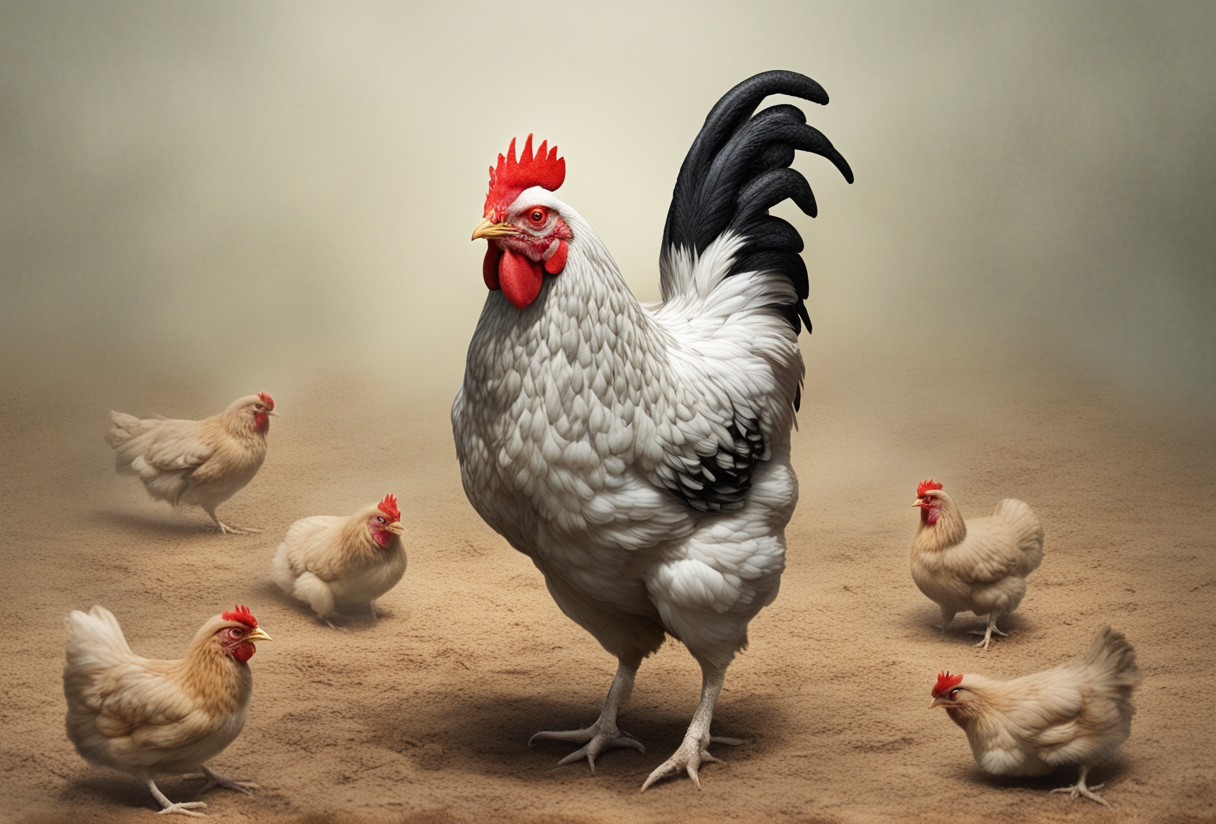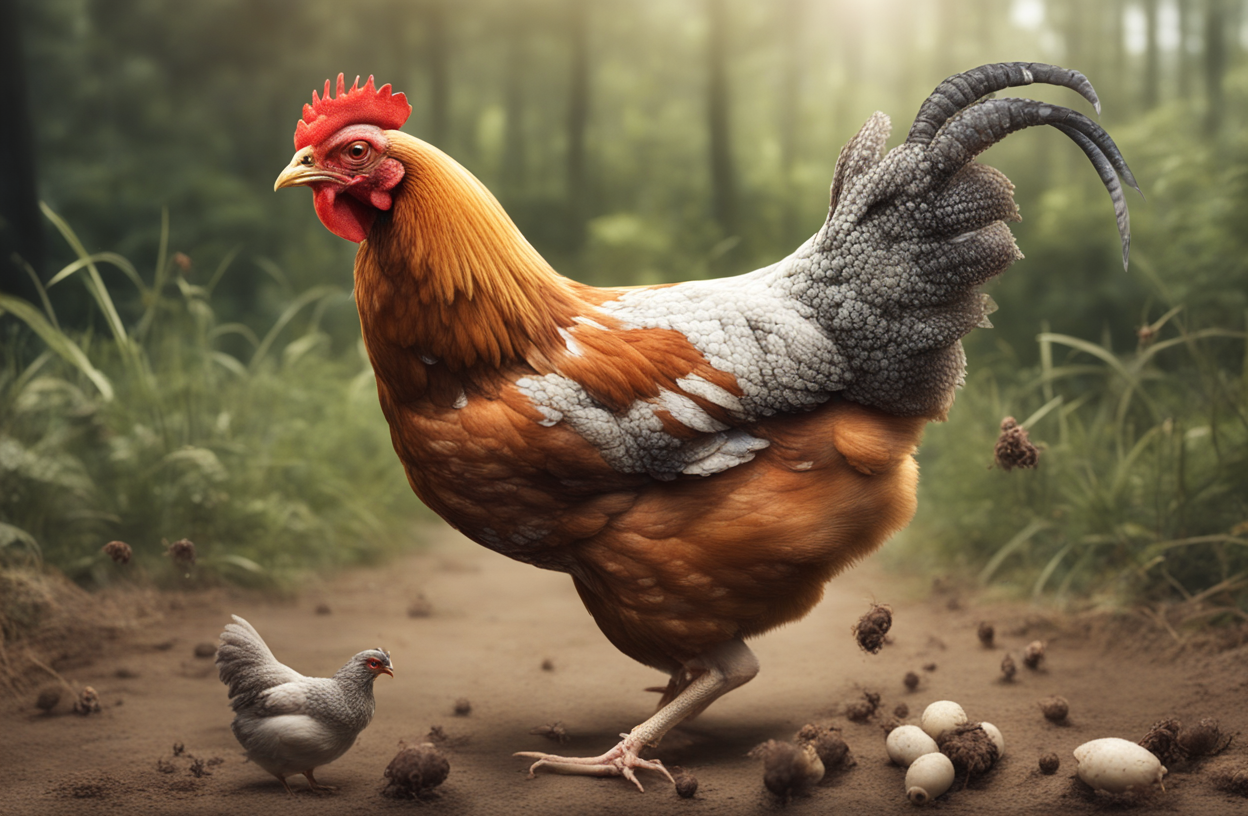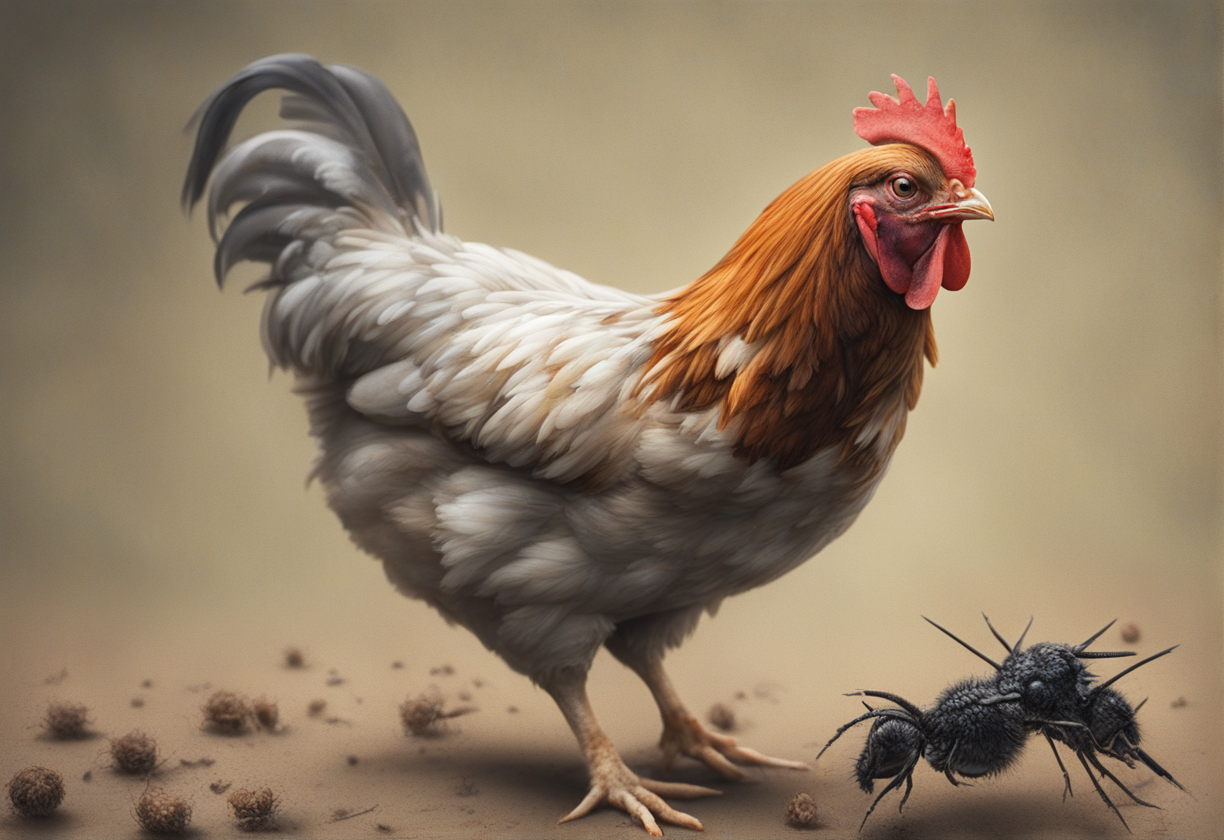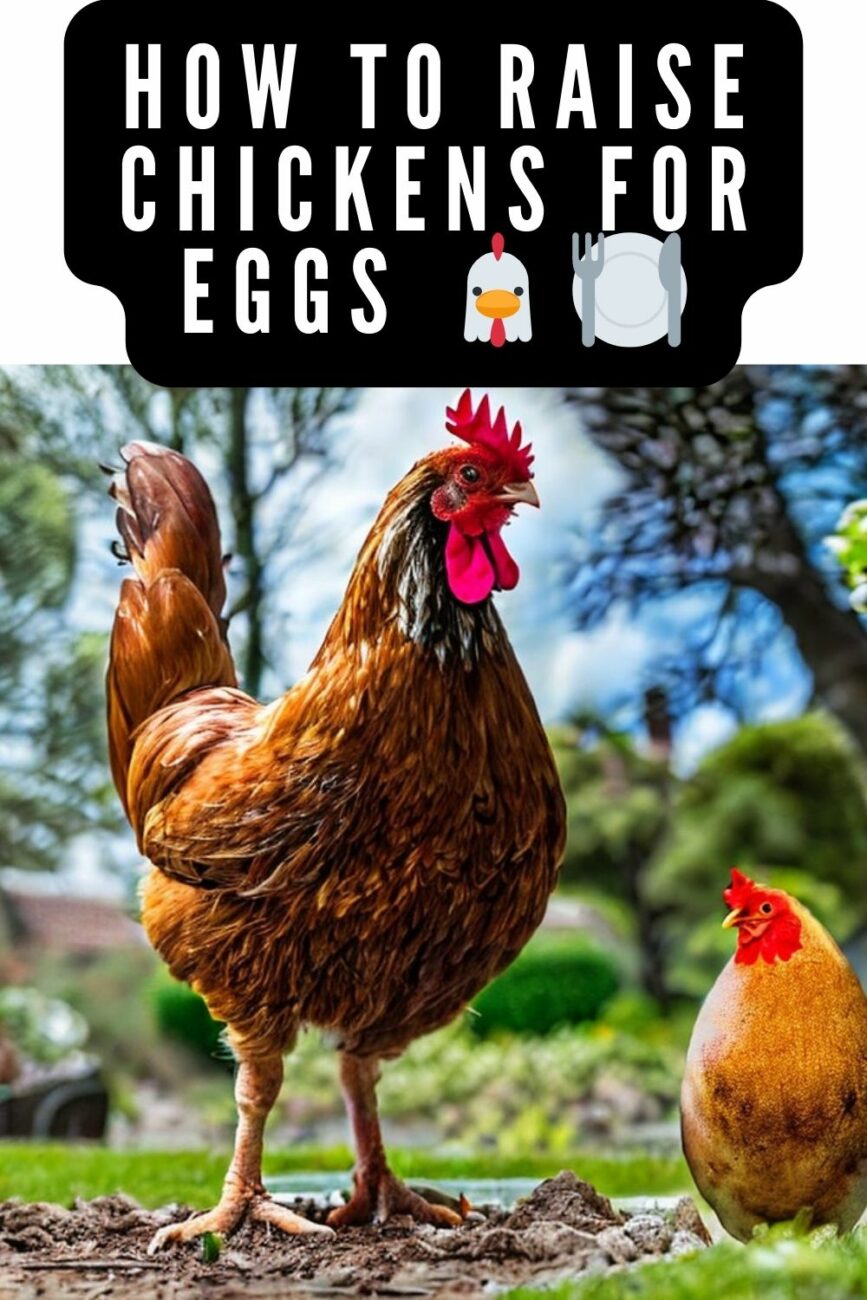I’ll never forget the first time I learned that chickens eat bugs.
I was 5 years old, trailing behind my dad as he went to collect eggs from our little backyard flock.
When he opened up the coop, I watched in awe as our Rhode Island Red, Henrietta, snatched a grasshopper right out of the air and gulped it down in one big bite.
“Whoa, did you see that?!” I exclaimed to my dad. She just ate that gross bug!” He chuckled and explained that chickens actually love eating insects.
It helps give them extra protein.
Over the years, I’ve seen our chickens devour everything from flies and worms to beetles and caterpillars.
But what about fleas and ticks – do chickens help keep those nasty bugs under control too?
Well, after researching the topic more today, I discovered that yes, chickens absolutely feast on fleas, ticks, and other parasitic insects! Keep reading to learn all about the handy “pest control” services your flock can provide…
Table of Contents
Your Feathered Friends are Hungry Bug Vacuums

Chickens are natural insectivores, meaning insects make up a normal part of their diet. They’ll happily eat almost any small bug that crosses their path – including pesky fleas and tiny ticks.
I’ve watched our chickens catch all kinds of insects mid-flight – lightning fast reactions! They also meticulously pick crawling bugs right from the ground. It’s crazy how focused they get, darting their heads around to spot even the smallest morsel.
When insects like grasshoppers try to jump away, our chickens chase them down like savage Velociraptors! It’s both hilarious and impressive to see.
One time, a cicada buzzed overhead and landed on our fence post. Before I could even register what was happening, our Ameraucana Marshmallow launched off the ground, snatched the cicada in mid-air, crushed it in her beak, then swallowed it whole. Ninja bug-catching skills!
Ticks and fleas don’t stand a chance against those predator instincts. If chickens spot them creeping around, you better believe they’ll stalk that bloodsucker down and treat themselves to a crunchy bug snack.
So in short – yeah, chickens make awesome natural vacuum cleaners, capable of clearing away insects in their surroundings with epic efficiency!
How Their Powerful Beaks and Strong Legs Help

A chicken’s beak functions like forceps, allowing it to skillfully catch and crush bugs with precision and ease.
They can clamp down surprisingly hard too – I’ve actually heard them crunching the exoskeletons of beetles and caterpillars from several feet away! It’s a distinct crackling sound that always makes me cringe a little.
But that crushing power comes in handy against tougher bugs like ticks. If a chicken spies a tick crawling around, you’ll likely see it tilt its head sideways to carefully grab the tick in its beak, then crack! – bye bye bloodsucker.
Their strong legs and sharp talons also help them rapidly scratch through yard debris to uncover hidden insects. This makes it easy for chickens locate and devour any fleas or ticks lurking in their surroundings.
I let our chickens free range in the backyard whenever I’m working outside. They flock around my feet scratching wildly through the dirt and mulch. I know they’re just looking for tasty worms and bugs, but I like to joke they’re helping me garden.
We had a nasty tick infestation under some bushes last year. But after just a few weeks of the chickens patrolling those areas, the tick problem disappeared. Seeing how ruthlessly they hunted for those ticks convinced me that chickens are truly the ultimate natural pest control!
They Keep Parasites Under Control

Free-ranging backyard chickens that have access to large yards or pastures can help dramatically reduce local tick and flea populations. As chickens roams around doing their thing, they constantly forage through vegetation and soil, picking ticks and fleas right off plants, leaves, etc. Any parasitic insects they find get quickly gobbled up!
Fewer ticks and fleas equals lower risks for you, your family, and your pets. My dog Rocky used to suffer horrible flea allergies every summer.
We tried every treatment and prevention under the sun with mixed results. But after getting our chickens, Rocky stopped having issues. He still hates taking flea medicine, so I think the chickens’ hungry bug patrol is the only reason he’s finally flea-free!
So if you’re battling a tick invasion or tired of finding fleas on your pets, enlist a flock of chickens! Let them patrol your yards and gardens, feasting on every tick and flea they encounter. Within a few weeks, you’ll likely notice the parasitic insect population declining big time. Just be sure to provide your helpful “pest control crew” shelter and fresh food/water. And don’t forget to thank them for their free backyard bug vacuum services with the occasional treat!
Chickens Will Hunt for Bloodsucking Bugs in Your Yard
When free-ranging, chickens spend much of their time busily scratching through soil, leaf litter, and vegetation in search of tasty treats. This natural foraging behavior works perfectly for helping them locate and eliminate ticks, fleas, and other biting insects on your property.
Hungry chickens are highly motivated hunters. If they know tasty bugs frequent an area, they’ll methodically scour every inch scratching and pecking away debris to flush out hiding insects. Then it’s game over for any unlucky bloodsuckers like ticks or fleas that get exposed! Your feathered exterminators will swiftly snatch them up for a high-protein bug snack.
I let my flock patrol our wooded areas and long grasses specifically to help control ticks. They get so excited when I open the gate! It’s like shouting “1, 2, 3 go!” at the Kentucky Derby. An explosion of feathers racing off on their tick search and destroy mission. Within an hour, they’ve covered the whole area hunting down parasitic hitchhikers. Hardworking helpers keeping my family safe – all while entertaining themselves with a bounty of woodland treats!
Rotate Different Areas to Cover All Hot Spots
Since chickens can only patrol areas you allow them to access, rotate their grazing range periodically to cover tick and flea hot spots around your entire property. This exposes bloodsuckers to your feathered bug vacuum crew before populations can explode out of control.
Check areas with tall grasses, heavy leaf litter, brush/wood piles, small wildlife dens, etc. These environments often harbor more ticks and fleas just waiting to catch a human or pet host. Let your chickens tackle these high-risk zones first when rotating. They’ll happily eradicate bloodsuckers and tidy up messy areas simultaneously!
I noticed way fewer ticks in our woodpile after assigning 2 hens to patrol it for several days. They scratched up every leaf and stick for nearly a week discovering all kinds of gross crawly things I’d rather not think about! But in the end, tick numbers plummeted, so it was worth it. Now the woodpile patrol is part of our flock’s monthly rotational duty.
Some Chickens Make Better Bug Hunters
Certain chicken breeds and individual birds tend to be more active foragers and better bug hunters. These extermination superstars will patrol wider areas and scratch deeper than their timid flockmates.
Our Barred Rock Ginger is a relentless bug Terminator. She patrols twice the area of other hens, flips logs and debris with her talons searching for creepy crawlies, and digs holes deep enough to almost disappear inside! Ginger catches the most insects by far, keeping her protein quota maxed out daily. She’s a proven tick and flea destroyer I can always rely on.
On the other hand, our Australorp Lucy is pretty mild-mannered and avoids getting her feet dirty too much. She usually lets Ginger uncover treats then snags her share like a sneaky seagull. So take note of your chickens’ foraging personalities when assigning tick patrols! Turn those energetic bug hunters loose in hot zones first.
Provide Food Incentives for Hard Working Exterminators
You can encourage your flock’s inner tick/flea hunters by handing out yummy treats when they follow you into problem areas. This positive reinforcement triggers their foraging excitement and motivates them to scratch up every inch eradicating bloodsuckers.
I bring along a bowl of mealworms as incentive when herding our chickens toward dense ticks zones bordering the woods. As soon as they hear me shaking that treat container, they come running! It becomes a bug bounty hunt with mealworm bonuses. More scratching equals more rewards. They work extra hard hoping to uncover an extra juicy earthworm too while eliminating those ticks.
You’ll be amazed at how enthusiastically chickens will obliterate pest insect populations when expecting delicious treats! Flock motivation combined with all-you-can-eat direct access equals 100% organic tick and flea control around your property.
Caution: Don’t Allow Chickens Near Tick-Infested Wildlife
While allowing backyard chickens to control ticks and fleas on your own property is smart, use extreme caution letting them mingle with wildlife hosting heavy parasitic insect populations. This poses disease transmission risks between species.
For example, ticks feeding on infected deer, mice or other hosts can transition pathogens directly to chickens through bites. Then your flock might unintentionally spread illnesses amongst themselves back home. So carefully limit their patrol boundaries if local wildlife wanders onto your property.
We occasionally spot deer near our wooded back fence line but luckily they never enter our yard space. Just to be safe, I installed netting at the fence perimeter to block wildlife access and keep chickens from nuzzling noses along that tick hot spot. Health protection for both parties!
Monitor Nesting Areas for Bloodsucking Pests Too
Don’t forget to let your helpful tick and flea hunters regularly patrol indoor coop and nesting areas too. Parasitic hitchhikers sometimes find their way inside on shoes or clothing, then try setting up camp to feed on unsuspecting hens.
Every few days, temporarily herd your flock outside, then thoroughly inspect nest boxes, perches, walls, floor spaces, etc for any signs of crawling intruders. Ticks gravitate toward wooden fixtures and fleas love hopping around in plush nest bedding areas. Stop invasions fast!
If you discover tick or flea squatters inside your coop, immediately purge the area then give your coop patrol crew full access to hunt down any remaining pests you may have missed. With enough practice, your chickens will keep indoor spaces bug-free too!
